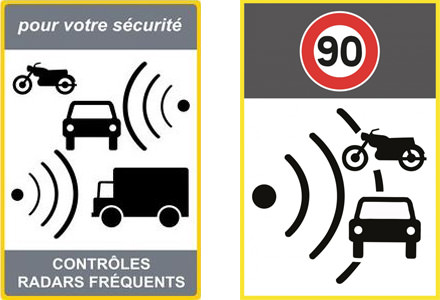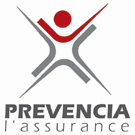It’s time to sharpen up on French speed limits – and the possible penalties. Last year’s roll-out of thousands of dummy speed cameras, the resurgence of increasing road fatalities, and the arrival of the summer’s dash to the beach should prompt us to recall the risks and our obligations.
The recent change in signage advertising the potential presence of speed cameras is another reason. The old style is on the left. The new style is on the right. Text has been replaced with easier-to-understand graphics and the speed limit on that stretch of road (or the distance for which the warning may apply):

French speed limits
Local variations may take precedence over these general limits, particularly in towns and during rush-hours, but the following limits obtain on most French roads most of the time:
| in DRY weather | in WET weather | |
| Autoroute | 130 km/h (81 mph) | 110 km/h (68 mph) |
| Dual cariageway | 110 km/h (68 mph) | 100 km/h (62 mph) |
| Open road | * * * 80 km/h (50 mph) | 70 km/h (43 mph) |
| Built-up zone | 50 km/h (31 mph) unless otherwise indicated | |
* * * Speed limits on open roads where there are no centre rails between opposing carriageways were dropped from 90 to 80 on 1st July 2018. For further information, see our more recent blog post on the subject.
Penalties for speeding in France
In general, the police or gendarmerie will treat you as follows if they catch you speeding:
- Moderate speeding will result in an on-the-spot fine and points lost on your French driving license.
- Speeding at 50 km/h or more above the limit may result in on-the-spot fine, a confiscation of your French driving license and the possible impounding of your vehicle.
Speeding detected by camera will, if you live in France, result in a letter being sent to your French address which will detail the fine and the points to be deducted. Obviously, there will be no arrest.
| Speed recorded above the limit | Fine (euros) | License points deducted | License suspension (years) | Jail term (months) |
| Less than 20 km/h (12 mph) above the limit | 68 | 1 | – | – |
| Less than 20 km/h (12 mph) above a limit that is less than 50 km/h (31 mph) | 135 | 1 | – | – |
| Between 20 km/h and 30 km/h (12 mph and 19 mph) above the limit | 135 | 2 | – | – |
| Between 30 km/h and 40 km/h (19 mph and 25 mph) above the limit | 135 | 3 | 3 | – |
| Between 40 km/h and 50 km/h (25 mph and 31 mph) above the limit | 135 | 4 | 3 | – |
| More than 50 km/h (31 mph) over the limit | 1,500 | 6 | 3 | – |
| Second speeding offence of 50 km/h (31 mph) or more over the limit | 3,750 | 6 | 3 | 3 |
Suspension periods and jail terms listed here are the maximum that can be handed down. Fines can be increased for late payment and reduced for speedy payment. The penalties above can be much more severe if accident, injury or fatality is involved.
Speed cameras and radar speed traps
Residents have been used to the progressive increase in the network of the country’s speed cameras by the side of French roads.They have tended to be well-advertised with clear warning signs (see above). You have no excuse for not keeping within the speed limit when such signs are used.
Radar speed traps are different and these are usually parked up in lay-bys, often using unmarked police cars, or signaled by the smart cuff of a gendarme’s sleeve protruding through a hedge. Your local newspaper often advertises the fact that the local gendarmerie will be having a blitz on a specific road on specific days.
Radar detectors
To help drivers keep track of these delights, a range of devices is available. Some surveys suggest that up to 90% of French drivers use one form or the other. But beware! Radar or laser detectors that attempt to detect the physical presence of radar speed traps are illegal in France. If you are caught using one, you could be hit with a fine of 1,500 euros, 6 points off your license and a three-year suspension of your driving license. The device can be confiscated. If it is attached to your vehicle, your vehicle can be impounded. These hi-tech, single-function devices serving no purpose other than to help you speed without being caught, are illegal.
Speed camera warning systems
However, a system that uses a database to warn of known accident black spots, as part of an in-car GPS device, is legal in France. Rather than indicating the precise location of radars and cameras, such devices flag up accident black spots where extra vigilance should be applied. Legal devices with this function, bought in France, will be identified with the “NF” mark. If they lack this mark, they will probably not be legal.
Cruise control and your GPS
Of course, rather than drive at your (higher than the limit) speed and slow down when your GPS sees you approaching an accident black spot, you could set your vehicle’s cruise control to not exceed the limit and/or you could set your GPS to warn you if you exceed that known limit. Making sure you update your GPS’s on-board data to reflect the latest speed limits, goes a long way to keeping you on the right side of the law.
Anyway, you’ll be driving within the speed limits, won’t you? As we always advise, check your insurance policy from time to time to remind yourself of the cover that you have.
The information provided here is for general guidance. The exact details of your policy will define your legal and contractual obligations. What is written there will take precedence over what is written here.
Ces informations sont données à titre indicatif. Pour connaître précisément vos obligations légales ou contractuelles en relation avec votre contrat d’assurance, veuillez vous référer aux conditions générales et particulières de votre contrat.
